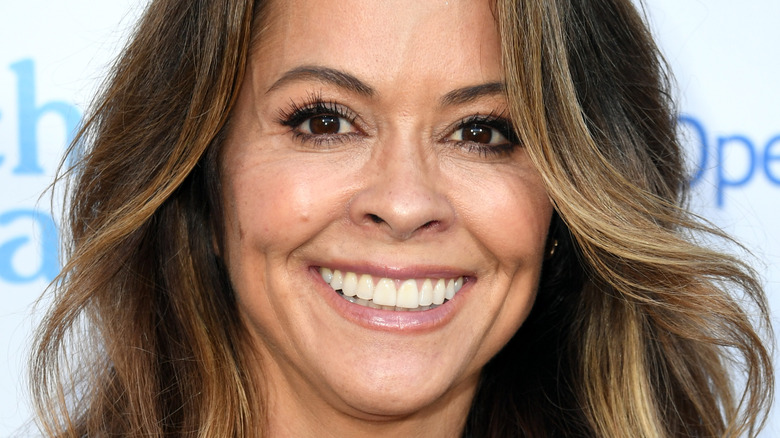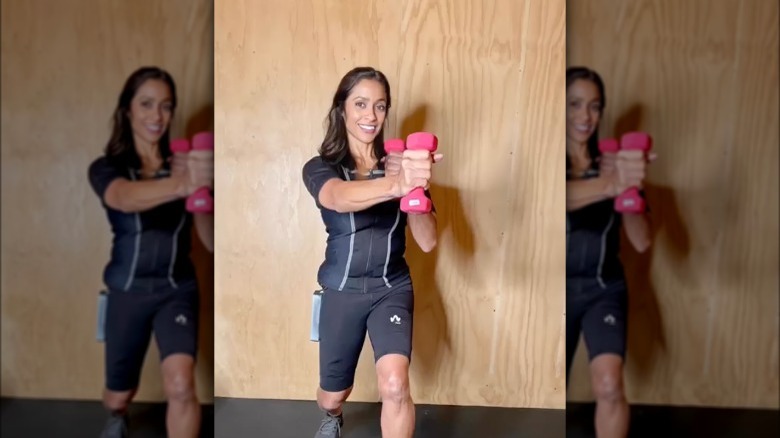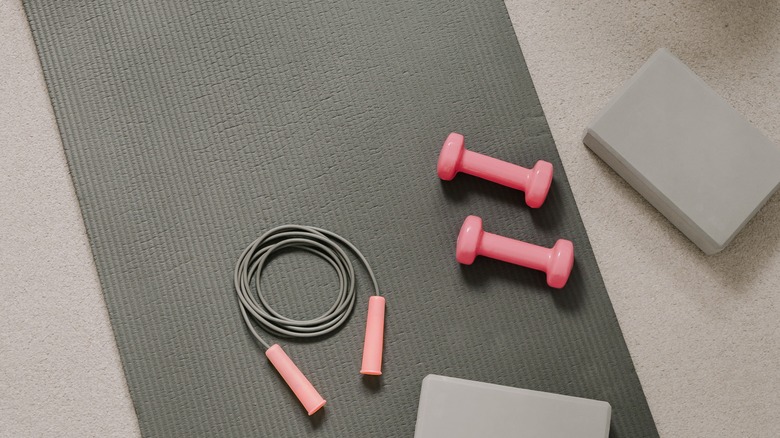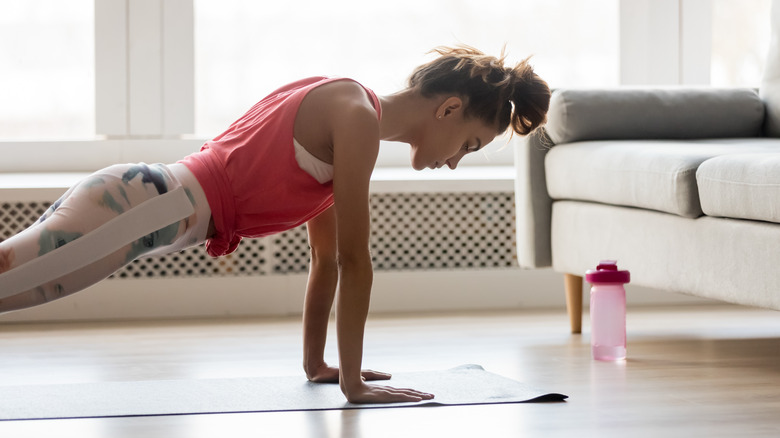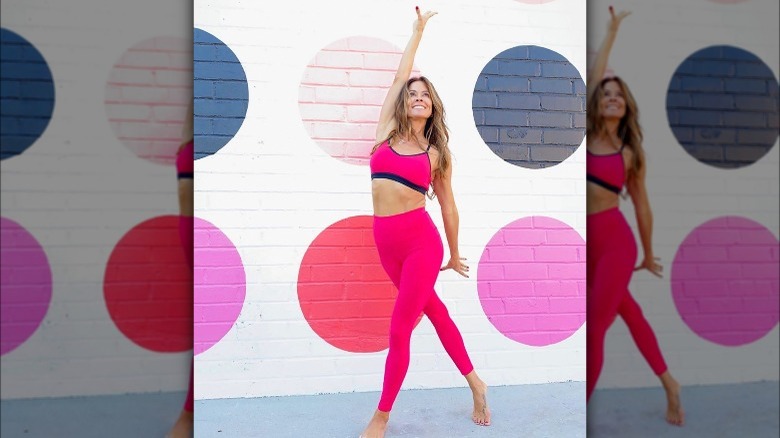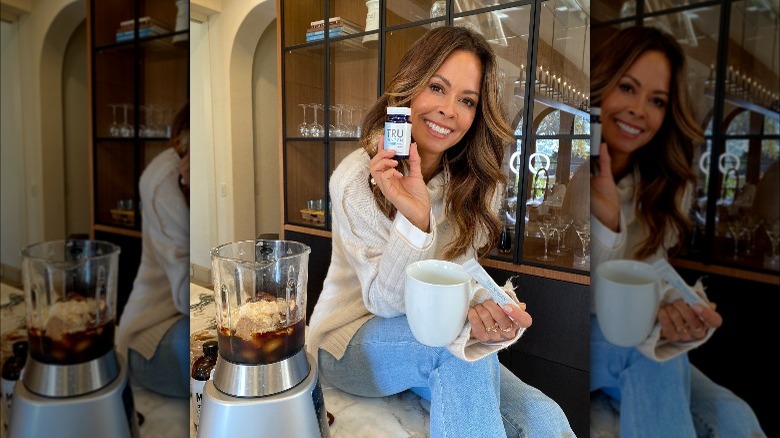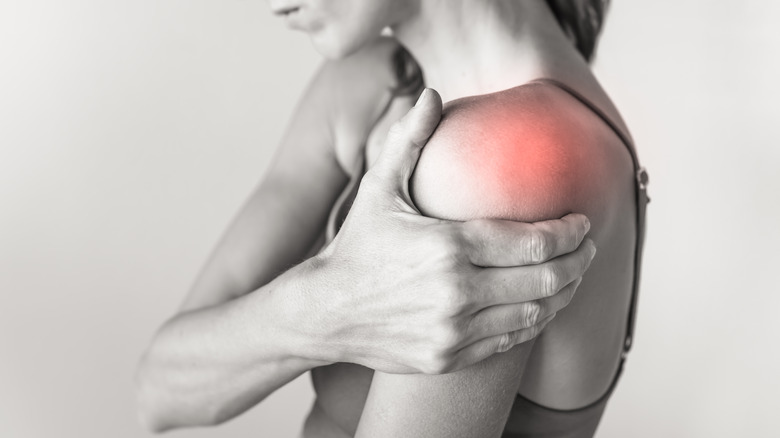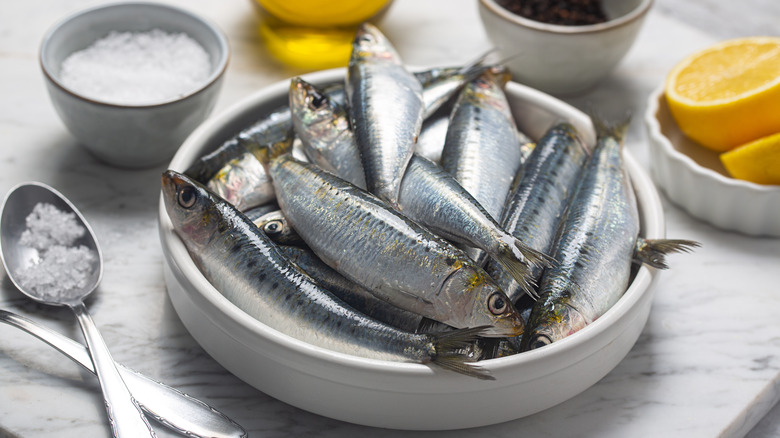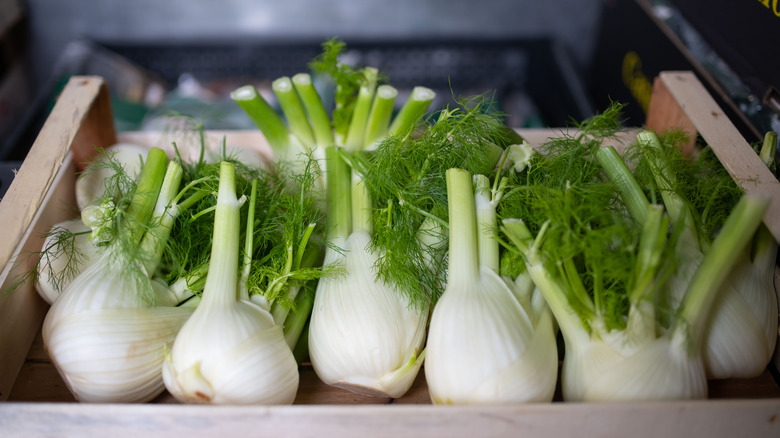Brooke Burke And Ramona Braganza Talk Fitness Tips And The Exercises You Are Missing - Exclusive Interview
Brooke Burke and Ramona Braganza are the women to go to for fitness tips. Burke, a longtime television personality and fitness guru, and Braganza, a celebrity fitness trainer, have teamed up for an exclusive interview with Health Digest. They elaborated on the importance of strength training in workouts, gave advice for beginners in exercise, and named two workout moves that are underrated.
Burke and Braganza have also partnered with Tru Niagen to promote NAD+, muscle recovery, and healthy aging. NAD stands for Nicotinamide adenine dinucleotide, which is a chemical compound found in your body that, in short, aids energy metabolism. As you age, your NAD production decreases. Burke and Braganza dug deep into how energy plays a factor in their lives and gave us tips to enhance your daily routine — from placing fennel in your water (making it more enticing to drink) to practicing Japanese water therapy in the morning.
Don't dismiss strength training
One thing that I've seen a lot on social media is people steering away from cardio and aiming their workouts more toward strength training and lifting. What are your tips to integrate strength training into your daily workout routine?
Brooke Burke: I've been working most recently on functional fitness and mindful movement. I have such a variety of workouts that I choreograph on my app, but it's really about tapping into core, developing strength to protect our body in a very functional way, but also making little adjustments and tweaks — whether it's the tilt of the pelvis, the closing of the ribs, the position of the feet so we can tap into all of those trouble areas. We call it "target toning." We need strength [to] support positions so we can tap into those more challenging moves.
Core strength protects our body. It gives us balance on most days, protects our back, and gives us the ability to work a little bit more specifically in different areas. [We need] more of it as we age as our muscles don't have the same density and capability. I actually use weights now — not heavy weights, but I use weights to build the glutes. I'm not afraid of using arm weights. A lot of women are — even of light hand weights to build that muscle so that we can maintain that muscle capacity.
I was afraid of weights as well, because I was like, "I don't want to look a certain way," but when I started using them, I loved it. It changed my body the way I wanted it to, and I feel a little bit stronger with more core training — definitely on the nose with that.
Ramona Braganza: I use weights and heavy weights. A lot of times when I shape my clients, like Jessica [Alba] or Halle [Berry], we're doing 15- to 20-pound dumbbells for chest press, which is quite heavy. But what I'm finding for myself when I do it — because I'm 61 now — if I don't do heavier [weights], I'm not seeing any results for my body. You have to work up to this. I've been doing the same thing with my clients for years with the weights and the heavier weights, but it also helps against osteoporosis and bone density. It's up to the individual.
It was a stigma where women lifted heavy in the past and they look like giant women. It's not going to happen unless you're training super intensely every day and if you're eating a lot of calories. You've got to find that balance where you're challenged enough so you see results, but you're not going to overdo it.
Weights aren't as scary as you'd think
Say a person has never truly exercised and is starting from zero, and they can't necessarily grab those 20-pound weights. What would your advice be for them?
Burke: I wanted to second what Ramona said, because so many women are afraid to use weights, and it's difficult to put on muscle mass. We can, but it requires such a commitment both nutritionally and physically. For people who are beginning, one of the hardest things is to start and to find that confidence and to begin a new program, a new challenge, and to step out of your comfort zone. That's getting through all of those things that are standing in your way.
It's small, attainable goals. I like daily goals. I usually schedule my workout week, but nobody understands their own body like the individual that's actually training. I love the concept of becoming a detective in our own body so we can figure out what works for us.
With my clients, weights are optional. I encourage everyone to do it, to develop strength, to try things, to challenge themselves, and to course correct in their workouts. We do get stronger, more coordinated, [and] more confident through every workout that we commit to. The more you do, the better you feel. When you feel good, you want to get up and do more. It's those first steps of beginning [and] making that commitment. I always say start small, try new things, listen to your body, let your body guide you, stretch and recover, take days off, push hard, break a sweat. I feel like we're working out smarter and stronger than ever before as women. It's an amazing time.
Braganza: It's also about finding things you like to do. I used to be a cheerleader with the Raiders for 10 years, and I have a lot of girlfriends that get together, and they don't move their bodies anymore like they used to. We go dancing and everybody's stiff again. Just have fun — whatever you do to get you moving in a group. Accountability is a big part of staying on a program. If you do it with your girlfriends, your husband, whoever — you have to motivate each other to enjoy and have fun at it. Then you'll love it and you'll get into it more. Then you'll start to see some gains, which are small steps first.
Push-ups and planks are underrated
I like the mention of accountability. Today I went to the gym, and I text my sister every time I make it to 1,000 on the stairs. She's like, "That's great." That makes me want to do it more.
Burke: Having an accountability partner, a fitness buddy ... We do a lot of programs where fitness isn't necessarily an isolated journey. People want to do it together. I believe the same thing — fitness should be fun. When you make that commitment, sometimes we cheat on ourselves, but you show up for your friends. It's about becoming a better friend to yourself.
What is one exercise or move that is totally underrated?
Braganza: I know my move — the push-up. Women are so afraid of push-ups ... I was a gymnast for many years competitively and have a lot of upper body strength, but I have to maintain it too. I can't do as many push-ups. But that is your functional move number one. Other than the physical benefits, it actually makes you feel more confident, more powerful, and more able to do things in life. What's yours, Brooke?
Burke: I actually love that. You reminded me of something — a lot of women are afraid to approach planks. I have learned to love planks this past year. In the same light as the push-up, planks will change your body. You develop core strength; it'll pick up your metabolism. I'm so glad that Ramona said that. This concept, this sense of accomplishment, is what gives us strength to come back and try it. We started a plank challenge last year. We started with 30 seconds; we're now up to a minute and a half.
That's hard.
Burke: It's hard, but we do this concept, "planks and thanks," where you use all 10 fingers and you tap all fingers — Pinky to thumb, 10 things you're grateful for while you're in your plank, grounded by your hands. It takes you out of, "I hate this. I can't do this," and it gets you into all of the positive things that you're grateful for. By the time you get done with your 10 — and maybe you run it a few times — you're done with your minute; you've changed your body. Don't underestimate these old-school methods — no one's reinventing fitness.
Stretching is just as vital as the workout
Braganza: We've both been in the scene since the '80s when all fitness began in LA. The big thing was the spinning that was starting ... now it's the Peloton. We didn't create spinning. A lot of the thinking that I have is simplified: Simplify your fitness. You don't need to reinvent anything. Nothing out there is going to do it faster for you. You have to do the work. Most of it is your mental state. Then you want to work the muscles in strength training so they tear and repair. All of that is as much on a cellular level as it is on a physical level.
Those are great points, especially push-ups and planks. I've been trying to get myself to do those, but my upper body is a little weak, so I need to work on that.
Burke: Do 30 seconds. Do it every day. Go about the house and do something. Come back and do it. If you do a couple minutes of planks a day, it will change your body. None of us love them. We actually like them now because we've been doing this fun thing, but let it be hard and live in that space of challenge, because where there's challenge, there's strength.
Absolutely. Let's talk about muscle recovery — what tactics do you use to recover from an intense workout?
Burke: I do a repair and recovery and energy shake post-workout. I intermittently fast, so I usually break my fast with that type of shake. It's got all the superfoods and everything I need in there hormonally — superfoods like energy matcha, cacao, antioxidants. I'm also a big believer in listening to your body and recovery days. I love yoga. Most of the time in my yoga, I add weights, so you'll notice it's like a chisel. I believe in taking that time for mindfulness [and] stretching. When I teach classes in Malibu ... we do a sound bath, and we do a recovery stretch and meditation.
Those are moments to be still, to tap into your body space, to listen to your heartbeat, to do an internal body scan to check in with your body head to toe and see what's going on. I'm obsessed with Epsom salt baths, drinking a lot of water, hydrating, breath work — all of these things that have been underestimated for a long time.
Why they both use Tru Niagen
Braganza: For me and my clients, a lot of them are very busy, so make sure you take that time for yourself. Not only is it a physical recovery as I age anyway, but I also have to make sure I'm eating the right foods and drinking the right water. I hydrate a lot. As far as supplementation, Tru Niagen, NAD+ [Nicotinamide adenine dinucleotide], is one of the products that I totally use myself because I know it's from a cellular level that we're replenishing our bodies. It gives us energy and rejuvenates and restores everything.
[Wellness is] all on a cellular level, in my opinion. It doesn't start from the external part. You look at me and I'm in shape. Personally, I have diabetes and high cholesterol in my genetics. You want to manage yourself from the inside out.
Burke: I totally agree with that. I struggle with some autoimmune diseases — several of them, in fact. I start from within, but I've been taking [Tru Niagen] for five years, and I was taking it before I was collaborating with the company. It's that one supplement that I take for my cells. NAD is something that we're starting to hear a lot about that I never heard of in the last even five years. We're born with it; our body produces it. Starting at the age of 50 and up, those natural production levels decrease, and decrease every 10 years or so.
Tru Niagen is an NAD booster, and it helps our body's natural production. [I] totally agree from a cellular level. It helps to promote healthy aging and healthy metabolism and all of these things. I look at it as so many different products coming at us — how do we cipher through those and know what's good and what's bad? If I can get my natural productions up and start from the ground up on the cellular level, I love that ... The Tru Niagen Immune has so many incredible components in it.
Braganza: I travel all the time. I'm always on a plane, and I've been using them all the way through the pandemic. It's a protection level that you can have.
Burke: The vitamin D, the vitamin C, everything that we need in there — curcumin, turmeric, things that we need for inflammation, and energy, and immunity ... That's super important.
Muscle recovery is key
I wanted to see how NAD+ supplements played a role in muscle recovery. You mentioned that it's more of an energy booster — it repairs. Could you go a little deeper into how that actually works?
Braganza: You need NAD in your cells ... It's a coenzyme that works with proteins and that actually will allow the process of replenishment of energy and all to happen. Without that, and as you age, you lose that. If you don't put that back into your body, then all the processes in your body are going to slow down, and you almost won't have enough energy to maybe even work out or function.
Burke: That's true. A simple way of looking at it is it's a defense against all the stressors in life, whether it's for nutrition, and sleep, and all these different things.
Braganza: Alcohol.
Burke: Yes — all of it. It's giving me a bit of an edge on combating those daily stressors. The way that we fuel our body is important. The way we feed our body is important. The way we train our body is important, equally as much as recovery. It sounds like [Ramona and I] share that same philosophy.
Braganza: We are examples — if you look at us and you're living that lifestyle, then that's what you need. You can still party and have your fun and all that, but you need to put back in your body what you're depleting it of at the same time.
Burke: I agree. This decade of our life ... I don't know about you, Ramona, but I feel healthier and that I have a better understanding of who I am as a woman in my body. I feel like I'm in better shape now in my 50s than when we met in our 20s and 30s, where, honest to God, I was measuring my food. I was eating five times a day. I was at Gold's Gym kicking my own ass. Now I'm doing things that feel good, that are mindful, that are doable. It's about mobility; it's about energy. I'm creating energy. Even on days when I don't have energy, those are the days I tell them, "Get out and work out. Take a walk; take a class."
Burke and Braganza love sardines
You both include Tru Niagen in your diets. Brooke, you mentioned your smoothies are a kind of muscle recovery, but are there any other foods or beverages that you always include in your nutrition plans to help meet your goals?
Burke: Like clockwork, faithfully — not just because we launched this brand — I do my superfood shake every day and make it for my kids. I drink a ton of water. I like natural, sustainable energy. I do matcha and green tea; I drink coffee. For me, it's about developing a healthy lifestyle that's sustainable that you can stick to. I love intermittent fasting. I try to eat fresh and clean and healthy in the colors of the rainbow. I try to get as many natural ingredients as I can in my body. I do put collagen in the shakes for a variety of reasons.
Is that the Vital Proteins Collagen?
Burke: I actually use the Alaya [Collagen], and I like it because it has five different collagens in it. I put a powder in my smoothie. Tru Niagen also has a stick, a powder stick that you can put in your shake. I try to hydrate and get as much sleep as I can.
Braganza: I'm super boring. I wake up and have to have breakfast right away. A lot of that is because if I'm training three, four clients in a row, you want to fuel yourself, and I'm hungry. I don't eat after 6:00 at night. I'm one of those by-the-book, old-school trainers. The first thing I have [is] my oatmeal with some protein powder in there. I need collagen — I'll put that into my oatmeal, and the hemp seeds, and the chia seeds, and the apples, all of that ... A couple hours later, I'm starving again, so I've been eating a lot more sardines.
Burke: I do too.
Braganza: I love sardines. I'll have sardines on this Ezekiel bread with some avocado, and that'll be a little snack, or I'll have the avocado toast with the salmon on it. Then I'll go on and it's lunch. I am very boring; I have salad with some kind of protein. For dinner, I'll have salmon with broccoli. I'm pretty much that person, but it's worked for me for so many years, and I can add more foods and things like that. I do have other foods, but it's interesting if you simplify things in life. I'm all about proportion size, the time of day you eat it, and what you're eating. Those are my three rules, and then I need to drink more water.
Make your water more exciting to drink
Burke: I drink a ton of water, and I have a lot of clients that don't. I'll put cucumbers in there, or sometimes fruit, but there's also fennel, which is something that is a little more European. You can cut off the fronds, the top stock of the fennel, and put it in your board base. It's actually gorgeous. French people do that, and it's beautiful on the table. It gives you that anise, that licorice flavor. It's really good for your tummy, [and] it tastes amazing — whatever you can do to make your water more enticing.
Braganza: I run around with [water] in my car, by my bedside. It's actually the first thing I drink in the morning. There's a thing called Japanese water therapy where I take that [in] the morning; I have a couple supplements that I take right away. You technically lie there with the water in your body. The water will hydrate everything before you get out of bed.
Burke: You drink it and lay down?
Braganza: If you drink it [and] you lay back in bed — literally a whole glass of water or even larger — you can hear the water starting your stomach juices. It's strange. But I wake up and feel much more energetic right away.
Burke: For five minutes, you lay down with that?
Braganza: 10 minutes. I work with Jessica [Alba], and she will put on a gratitude meditation or something, and she'll listen to it before she gets out of bed. If you have your water, do your meditation and then get out of bed, it adds another layer to your morning. Your morning is your time.
Burke: I'm going to add that. I love meditation in the morning — super important to set yourself up.
What is one health trend that you feel doesn't work?
Burke: Fad diets. I don't believe in them. The intense keto that sacrifices everything for a quick fix where you're depleting your body of water weight and doing something that's miserable, and then you fall off and you're right back where you started ... I want a healthy, sustainable lifestyle, period.
Braganza: Also, any kind of workout [that] is one way and no other way. You'll enter into a program, and it's super hard from the beginning to the end without any kind of stepping it up ... It should be for a beginner. You don't throw a beginner into an advanced program and expect them ... I won't name any programs that do that, but there's a way to learn properly. I'm about safety and form.
To learn more about Tru Niagen's NAD+ supplements and other products, visit their website. Keep up with Ramona Braganza's latest projects on her Instagram page. Check out Brooke Burke's website to access her workout offerings.
This interview has been edited for length and clarity.

